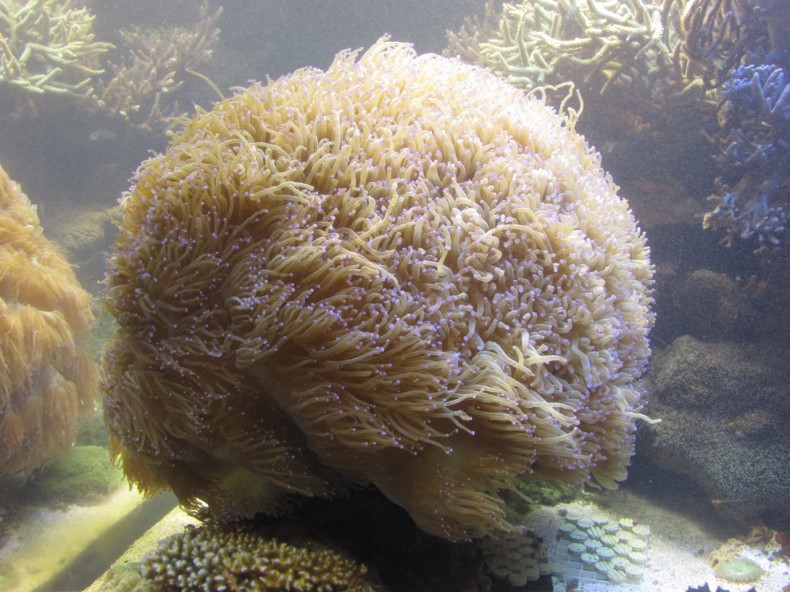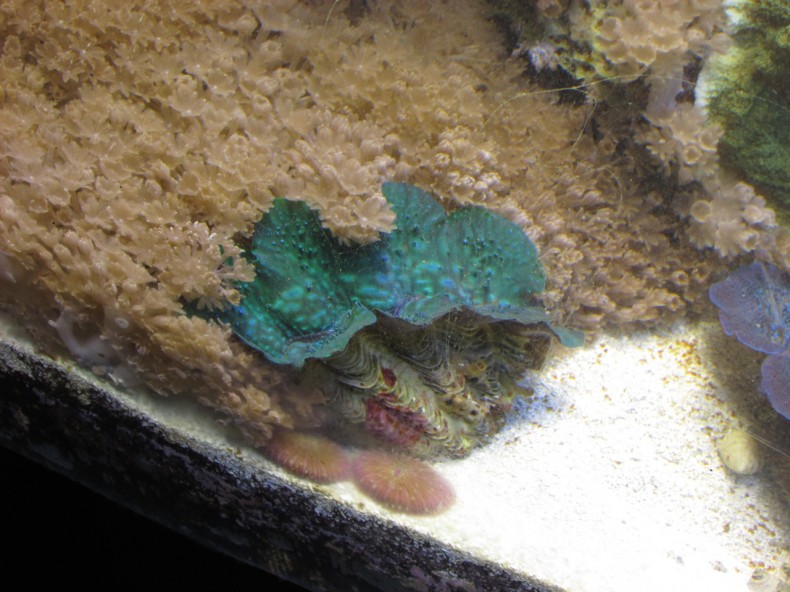 The first thing I saw when I walked into the National Zoo’s Invertebrate Exhibit on Saturday was a glass tank filled with corals. And the first thought I had was, oh my god, they’re so beautiful.
The first thing I saw when I walked into the National Zoo’s Invertebrate Exhibit on Saturday was a glass tank filled with corals. And the first thought I had was, oh my god, they’re so beautiful.
In the tank, an explosion of star-shaped mouths opened and closed in time to some inaudible rhythm. Nearby a thousand stalks, each tipped with its own fluorescent bulb, undulated in the current like so much wheat in a breeze. A blue and turquoise-fringed underwater mushroom colonized a discarded shell, and from behind a coral skeleton a red mini-lobster poked its antennaed head.
The second thought I had was, these things look totally alien, and yet they’re all animals, which means we’re related, and they’re having some sort of experience of life that isn’t altogether different from my experience of life.
I certainly wouldn’t have had this moment of interspecies communion if I hadn’t come to the Zoo. Nor would I have spent minutes transfixed by the comb jellies circulating in their own small tank, their refractive cilia beating in waves like tiny electric carnival lights. The ghostly jellies seemed to be simultaneously there and not there; how can any thing that has to do the hard business of living be so insubstantial?
Like most people who live in or around DC, I too rarely make the trip to any of the city’s world-class free museums. But I overcame inertia because I knew it was the last day the Invertebrate Exhibit would be open to the public. The Zoo’s press release and this article from Wired blame the closure, predictably, on money, or rather the lack of it. The exhibit costs $1 million to operate and apparently would have required $5 million to upgrade—though why our wealthy nation can’t muster a few millions for the creatures that make up some 97% of the animal kingdom is beyond me.
Certainly the anachronistic exhibit was in need of a facelift. It seems a bit depressing nowadays to see creatures living out their lives in small glass cages, many of which housed only one or a few individuals in meager habitats. The exhibit’s signs were poorly lit and provided limited information; some were downright confusing. For example, above the coral tank, text read:
Around the world, coral are dying due to human influences. The National Zoo collaborates with other zoos and aquariums to perfect the breeding and growing of threatened coral. Zoo animal care and research staff participate in a Smithsonian Coral Conservation Program for the future recovery and reintroduction of coral.
Can we not, finally, call out the “human influences” for what they are: global warming and ocean acidification? And are we to conclude that the Zoo plans to preserve the coral until humans die out and then reestablish it, perhaps as our species’ final act?
Nevertheless, there is something to be said for putting humans face-to-face with actual organisms, not the glitzy display technology now fashionable in museums. Animals can surprise us in ways that computer programs never will. With the closure of the Invertebrate Exhibit we lose an opportunity to step, however briefly, out of our self-centered lives and into those of some of our far-flung animal cousins.
We also lose a chance to understand a bit better species and ecosystems that are frighteningly important to us—and frighteningly threatened.
And we will lose out on a lesson about what life is at its most basic: eating locally, living in community, making do with what’s around you. We could all stand to learn a thing or two about that.
_________
Photos by Gabriel Popkin
I am a freelancer science and environmental writer in the Washington, DC area (Mount Rainier, MD to be precise). I’ve written about almost all fields of science, but lately I’ve been specializing in physics, Earth and planetary science, climate and environment. Lots of recent clips and a blog I occasionally post to are available at www.gabrielpopkin.com.

One thought on “Guest Post: Farewell Invertebrates, We Hardly Knew You”
Comments are closed.